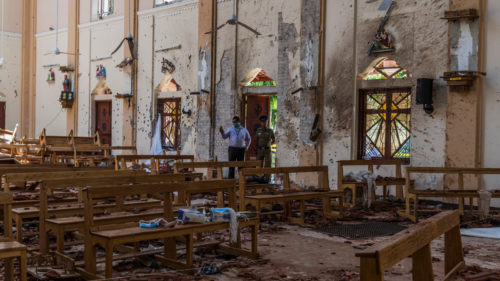 If I describe the suicide bombers in Sri Lanka as monsters, I hit the end of understanding. Monsters act monstrously. We are not monsters. Therefore how can we make sense of the motivations of those who strap on suicide vests and walk among women and children and among those at worship, utterly vulnerable and trusting, and click a trigger that triggers explosions that smash bodies?
If I describe the suicide bombers in Sri Lanka as monsters, I hit the end of understanding. Monsters act monstrously. We are not monsters. Therefore how can we make sense of the motivations of those who strap on suicide vests and walk among women and children and among those at worship, utterly vulnerable and trusting, and click a trigger that triggers explosions that smash bodies?
All of these are important, but for now put aside the complications of fanatical sects in Islam, the political undercurrents at play, and the cycle of violence and vengeance. The baseline motives for political mass murder wherever it occurs, whether used by the state or by religions or by ethnic or racial groups are consistent. A suicide bomber, a militia, a squad of soldiers, whatever, determine that those who must die are not human beings but a kind of disease or a repellent ‘thing’, and therefore it is permissible to kill them. The logic is inexorable: Look at what THEY have done. THEY are animals or worse. Annihilate THEM.
Second, in order to act, the killers must give up independence of thought. They must embrace a belief, a faith, whether secular or religious, or at least surrender to it, and in doing so, push aside doubt, conscience, training, and what we think of as common moral precepts.
If we take nothing else away from these atrocities, we must remember these ideas:
We cannot allow governments or political parties or friends or religions or leaders to tell us who is human and who is not. If we accept any division of humanity into better and inferior, no matter how we dress it up, we are complicit in any horrors that follow.
We must retain our independence of thought, and that means resisting propaganda in all its forms and resisting our own fears and ugly impulses. GroupThink is always dangerous.
Whenever these events occur, I hold onto what immediately follows as the best measure of hope — strangers rush into the scene, into the carnage, into the screams and begin to give aid and comfort. Rebecca Solnit wrote, “the assumption behind much disaster response by the authorities — and the logic of bombing civilians — is that civilization is a brittle façade, and behind it lies our true nature as monstrous, selfish, chaotic, and violent or as timid, fragile, and helpless. In fact, in most disasters most people are calm, resourceful, altruistic, and creative.”*
Life itself is the sacred fact, and when the world is coming apart, we know it.
*from Hope in the Dark: Untold Histories, Wild Possibilities